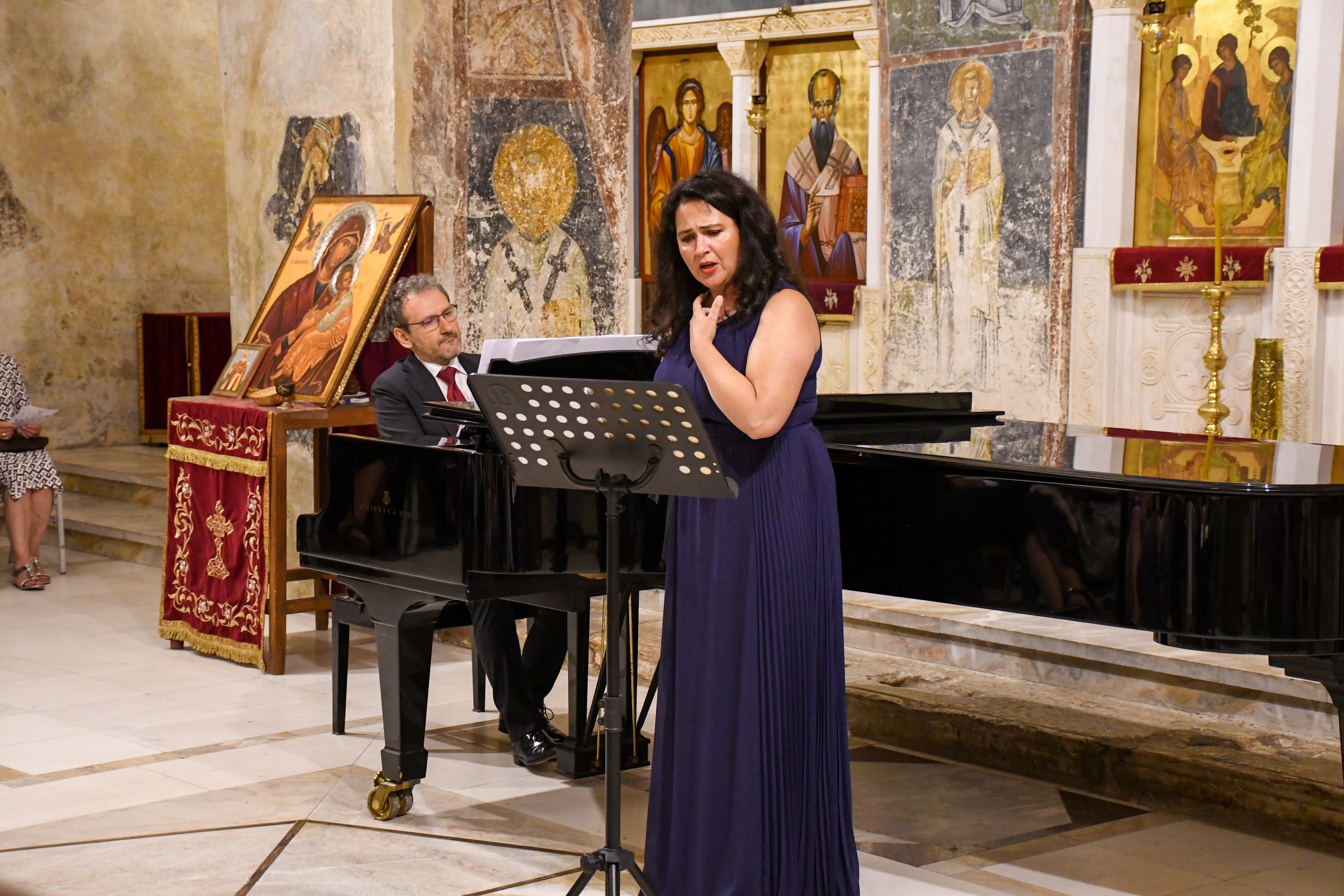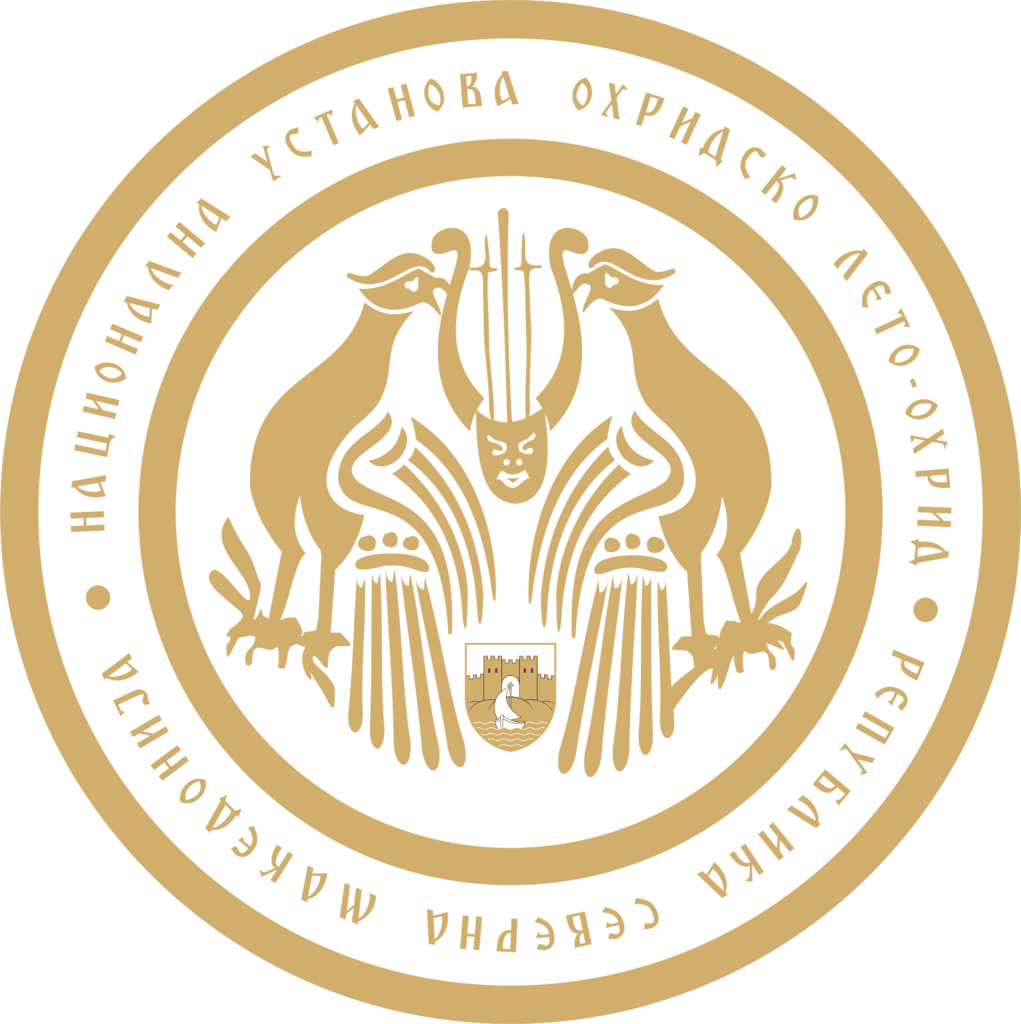
With the concert of one of the lead opera artists in Italy, the soprano Daria Massiero, who performed with piano accompaniment by Andrea Campora, the traditional Italian Evening within Ohrid Summer Festival took place. This evening is regularly organized with the support of the Embassy of Italy in North Macedonia. Giving symbolicism to the renewed cooperation between Italy and France, by signing the Quirinal Treaty in Rome, last year, the Ambassadors of the two countries, close to the Republic of North Macedonia, exchanget their presentations of the French and Italian evening (which took placa a day after). Thus, at the beginning the Ambassador of France, Cyrille Baumgartner, addressed, and then followed the Ambassador o f Italy, Andrea Silvestri, who, announcing the Italian artists Massiero and Campora, pointed out that music as a universal language is food for the soul and is especially significant these days, offering haven and hope for better future.
Daria Massiero, who performs in the leading soprano roles at Italian repertoires on many stages in Italy, simultaneously building an international career in many European and worldwide opera stages, for this concert performance, in piano accompaniment by the prominent Italian pianist with international career, Andrea Campora, much respected piano-accompanist of opera singers, offered two music thematic chapters, transmitting the core of the Italian vocal art.
In the first part of the concert, in her simple, spirited artism and warmly realized details, Massiero gave an interesting choice of Neapolitan canzonas, romances and film music themes. In the acoustic ambience of the church St Sophia resonated the performance of the Neapolitan „Non t’amo piu“, „Ideale“, „La Serenata“, „A Vucchella“ and „L’ultima Canzone“ by Francesco Paolo Tosti and the much popular „Non ti scordar di me“ (at the audience’s pleasure, repeated in the encore) by Ernesto di Curtis, which the Italian soprano, building a nostalgic character, performed with a notable sensibility and emotional maturity. In the whole concept, as a follow-up and completion of this part, perfectly fit the composition “Musica Probita” by Stanislao Gastaldone, as well as the film theme by Ennio Morricone, “Nuovo cinema paradiso”.
The artist put the focal point of the concert in the second part, where her vocal showed its dominance, and, a bit of, carefully dosed, her artistic potential. In this part, she performed five opera arias, dominantly from the Italian Verismo literature, depicting five mini-portraits of five opera heroines, through their most remarkable opera arias, successfully developing the basic dramatic lines of the characters.
With the aria „Tacea la note placida“, from the “Troubadure” by Giuzeppe Verdi, lyrically depicting her romantic, and even more, contemplative character, she created the atmosphere of Leonore. With a refined emission of a hardly-even-heard pianissimo, she pointed in the cadenze, while the virtuose part of the aria was performed with a perfect legato, uninterrupted by the brilliance of the coloraturas. In the most popular arie from the opera “La Wally” by Alfredo Catalani, „Eben ne andro’lontana“ with a gracious performance of the long and wide melody lines, underlined the melancholic niche, creating an attractive tone picture. Skillfully manuevaring with the crechendo use, she suilt the necessary tension expressing the inner condition of the drama character, transforming her gentleness into a strict expression.
Massiero dedicated the concert finale to the opus of Giacommo Puccini, filling the church temple with the sound of the most popular opera arias from the operas “Gianni Schicci”, “Madame Butterfly” and “Tosca”. She showed a notable gentle expression at performing „Oh mio babbino caro“, depicting the atmosphere of the in-love Loretta who sings the aria kneeling before her father. With a nicely coloured vocal, a clearly defined position in the performance of the melody leaps, and again, thanks to the skill in the dynamic nuancing, this short, yet effective and popular opera aria, suitable for concert performance, got its successful interpretation. Expressing an emotional eruption, the culmination the the concert was reached with the performance of „Un bel di vedremo“, where she left the strongest impression. Expressing all the attitudes, dreams and hopes of the young Cho-Cho-San, grading from pianissimo to fortissimo, she brought the lyrical beauty of the aria with all its dramaticism. The concert programme was finished with the worry of the character from “Tosca” in „Vissi d’arte“, bringing all the changes in mood and changing the expression of the interpretation from nice, gentle intimate singing, to expressive, but noble end.
In the completion of the tone picture of the concert and the refinement of the vocal emission of Daria Massiero, a huge credit had the amazing piano accompaniment of Andrea Campora. Carefully following the pulse of the solo performance, Campora subtly, but confidently created the suitable tone. His mastery of the piano came prominent in the solo piece of “Intermezzo” from the opera “Cavaleria Rusticana” by Pietro Mascagni, where with suitable interventions in the piano expression, he subtly overbridged the two opera blocks.
Aleksandar Trajkovski

